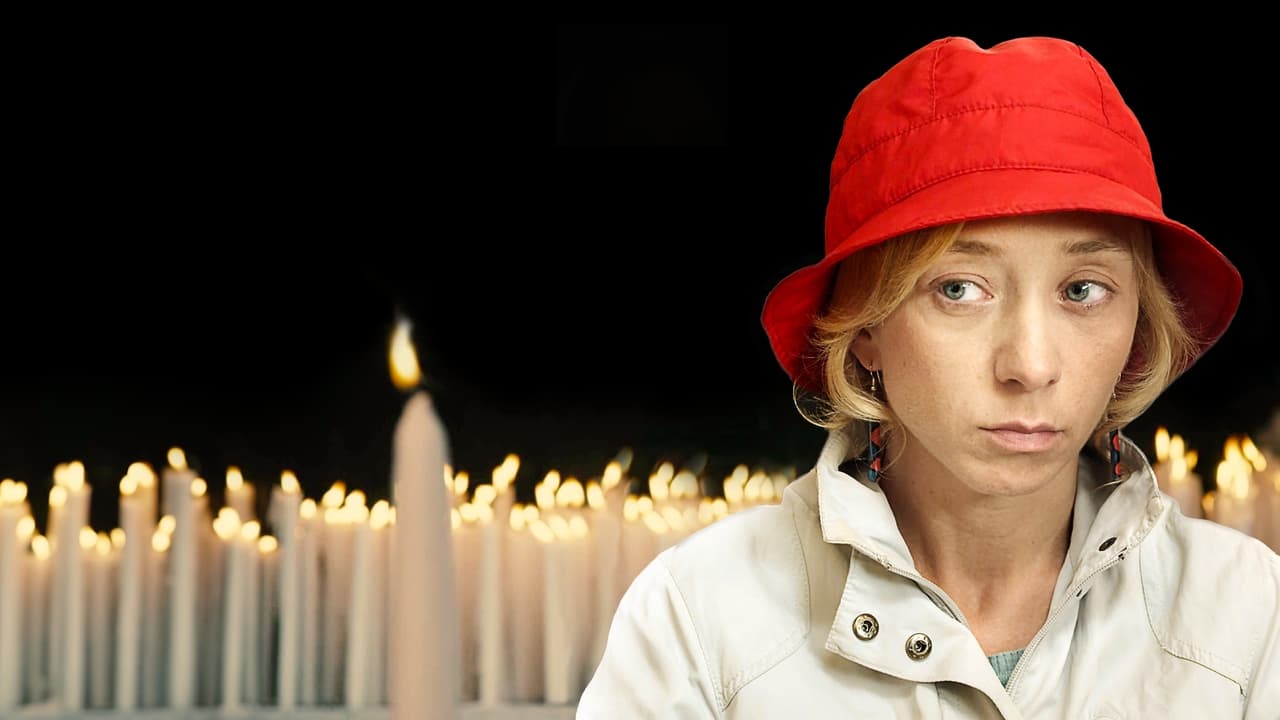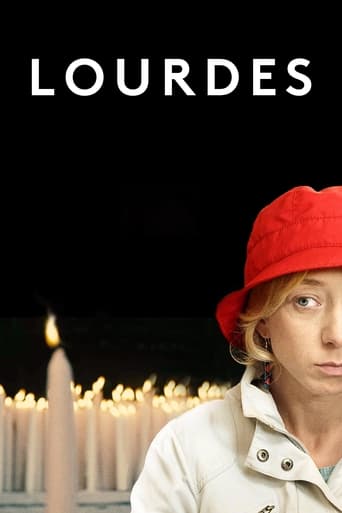

Lourdes is a famous Catholic shrine in France, visited by pilgrims from around the world seeking miraculous cures for serious medical conditions.Christine(Sylvie Testud) is wheelchair bound due to multiple sclerosis. Although not deeply religious, she decides to try to be healed by divine intervention. After a few days, she slowly is able to get up and walk. Other visitors with much more faith than Christine have philosophical debates on the fairness of it all. She meets a man while apparently making progress physically, but the budding romance fizzles quickly when the guy proves to be unable to accept her limitations. A night view of the city with only the faithful holding up candles while Ave Maria plays in the background is simply breathtaking. I am not personally religious, but I grew up Catholic and can appreciate the beauty of the symbolism and message. Jessica Hausner does not preach to the audience at any point, but gives us the opportunity to make up our own minds about faith and belief in miracles. Lourdes is an interesting conversation starter and a good movie.
... View MoreAustrian screenwriter and director Jessica Hausner's third feature film film which she wrote, premiered In competition at the 66th Venice Film Festival in 2009, was screened in the Contemporary World Cinema section at the 34th Toronto International Film Festival in 2009, was shot on location in France and is a France-Germany-Austria co-production which was produced by producers Martin Gschlacht, Philippe Bober and Suzanne Marian. It tells the story about a young woman with Multiple Sclerosis named Christine. She is chained to a wheelchair and can only get out if she signs up for cultural or Christian trips. Christine has previously visited Rome, but her next destination is Lourdes, the iconic site of pilgrimage in the Pyrenees Mountains.This finely tuned fictional tale is set in the Christian pilgrimage town Lourdes in France, a fine choice of location, where the Virgin Mary apparently appeared to a 14-year-old girl named Bernadette Soubirous in 1858, and Austrian filmmaker Jessica Hausner tells the story about a reserved though smiling and obliging woman who arrives at Lourdes hoping to be cured of her chronic illness. Jessica Hausner's quiet reflection of the intangibility concerning miracles and peoples individual relations to their faith is intellectually debated and asks several interesting questions that are also answered. All though her film has elements of divinity by it in the use of music and some remarkable scenes, it is by no means an overly religious film. "Lourdes" is rather a concentrated study of an enigmatic theme and a film where the characters reactions and reception to the abstract is the core and where the existential converges with the mysterious and the distinct with the abstract.Austrian cinematographer Martin Gschlacht's skillful and structural cinematography compliments Jessica Hausner's clear vision, and her steady, stringent and partly static direction is at its best when she films the main character from versatile perspectives and creates describing portraits of an archetype character, excellently played by French actress, screenwriter and director Sylvie Testud in a vital and radiating interpretation of a character that only has her face and her words to express herself with. Most actors delivers convincing acting and Jessica Hausner's film has a strong humane warmth that shines through the heroine's being, and an elusive atmosphere which is effectuated by the esoteric faces of the guests and employees at the place that has been called the Catholic Church's answer to Disneyland. An innovating and artistic film from a director with a recognizable personal style where one is left feeling like having seen something that lasted significantly longer than its running time.
... View MoreThis movie was shot in Lourdes, with the agreement of Church authorities, but after watching it we have to think if today the outcome would be the same.It's a very slow movie that follows in a documentary way a group of pilgrims during a week in Lourdes. It shows the spiritual believes and hopes of people, but also the business, the envy and greed that establishes between the group, when a "miracle" finally occurs. The main issue is: why her and not me? After all, people are there to have a spiritual experience or to be healed? And if so, what should we (they) do to be the ones to receive it? Also, we witness the process of acknowledging a miracle, with all the caution put into it by church doctors. The most interesting thing here is that nothing is explicitly told, but if you "look" into what is going on with a critic mind, you will notice that there is a lot more behind "believing".I really think that being religious or not has an influence on how you understand this movie, due to the almost casual way that things are shown. And there is a tremendous irony going on there.
... View MoreJessica Hausner's story of a young woman who appears to be cured of MS whilst on pilgrimage to Lourdes is a patient, fluid film that moves between satire and compassion. It often exhibits a genuine empathy for the core tenets and consequent outward trappings of Catholicism. As a general examination of the Catholic faith it's accurate and probing, capturing the unavoidable selfishness and vanity of us all even in the face of our own attempts at generosity or even piety.Yet I liked this film more because the omnipresent core of Catholicism recedes as subject. Quietly but surely, the individuals become the focus of the film. Of course, at the centre is Sylvie Testud's Christine, a marvellous performance in which intellect and emotion is in perpetual, discreet motion - but there's no self-pity and, apart from a rather dislocated intonation of standard liturgical incantations, no mention of God. Christine doesn't reject the theme park of piety revolving about her but she seems to find it a focus for a personal confrontation with her affliction. Key to the offsetting of this is a performance of equal discretion and focus, that of the genuinely pious but equally worldly Gilette Barbier as Frau Hartl, with whom Christine shares a room. The other satellite roles are all well-taken; I did like that Léa Seydoux never overdid her turn as the immature nurse assigned to Christine.A well designed and paced film, Lourdes also has a moments of wit. It not only examines the nature of devotion but does so in the appositely Christian context of an interesting yarn. 7/10
... View More